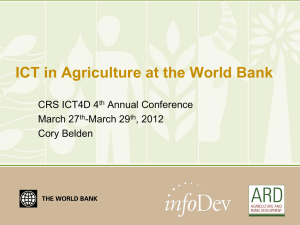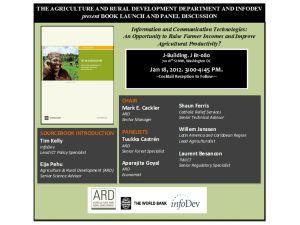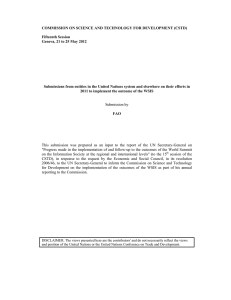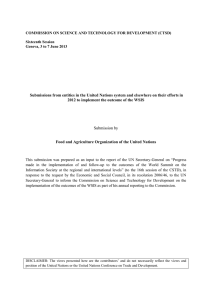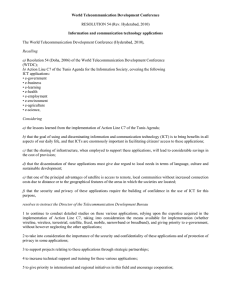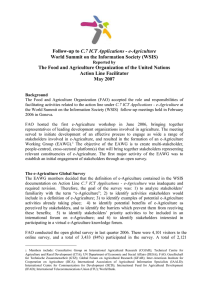National E-agriculture strategies Experience from countries in Asia & Pacific
advertisement
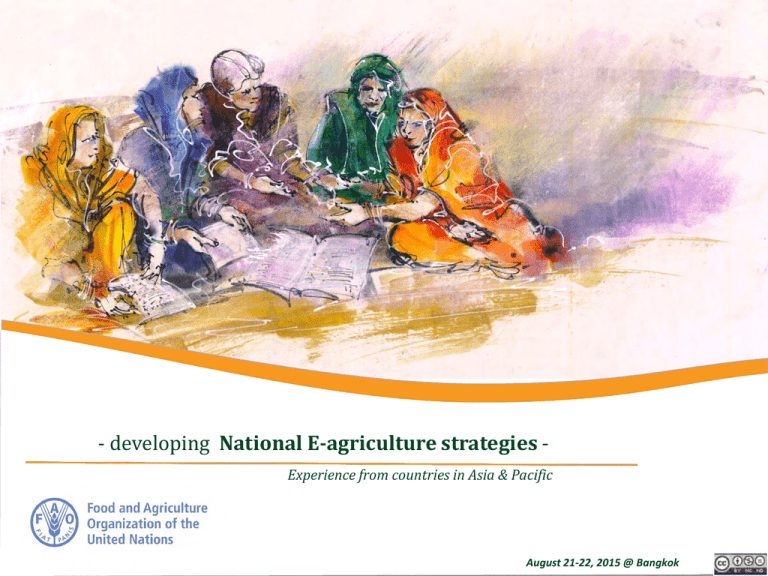
- developing National E-agriculture strategies Experience from countries in Asia & Pacific August 21-22, 2015 @ Bangkok Challenges facing agriculture & food production © discover.isif.asia © swissmack/ Shutterstock.com Access to nutritious food – no malnutrition Sustainable Farming A world without hunger Zero food loss and waste Crop Intensification Sustainable Livelihoods Safe food More crop per drop Climate smart agriculture © www.agriculturesnetwork.org © www.ong2zero.org ICT Technology and Agriculture application trends Interactive voice response TELEPHONE Agriculture info and markets COMPUTERS AND WEBSITES Expertise sharing , Advisory, Community Weather, Universal accessibility, Remote Sensing Advisory, Sales, Banking, Networking BROADCASTING SATELLITE MOBILE Global knowledge sharing, social media, e-community, banking, market platform, trading, etc. © en.people.cn INTERNET AND BROADBAND SENSOR NETWORKS C&I DATA STORAGE AND ANALYTICS Real time information availability, better data quantity and quality, decision making Precision agriculture, Better informed decision making, A more connected future…. Source: ITU A peak into the future of ICT in agriculture 3D food printing is it the next big thing? * Foodini – prints Pasta & Chocolate Precision Agriculture on a larger scale Big Data, Cloud Computing & Connected Networks © http://www.incrediblethings.com * Sensor networks * Drones, UAVs, GIS mapping * Internet of Things (IoT) NASA Funding 3D Printed Pizza What is e-agriculture? • an emerging field focusing on the enhancement of agricultural and rural development through improved information and communication processes. • Includes standards, norms, methodologies, tools, development of individual and institutional capacities, and policy support are all key components © dreamstime.com • involves the conceptualization, design, development, evaluation and application of innovative ways to use ICT in the rural domain, with a primary focus on agriculture. REDUCES risk and adverse effects Identifies counterfeit crop production products Mitigates through micro-insurance Encourages more investment in the sector Ease of enabling traceability & recall Uganda pilot authenticates input products using scratch-cards and text messages (SMS) Photo credit: FAO IMPROVE planning and consensus building - for land and water use Support adaptation and resilience Informs land reform/agrarian reform Engages communities (social inclusion) Improves information flows “Application of new and contemporary ICTs for rural and agricultural development in the Asia-Pacific region has been advancing quite rapidly over the last decade.” SUPPORT environmentally sustainable farming Reduces negative environmental impact of inputs Optimizes water management Reduces production related costs “An initiative by the Government of Turkey that provided higher granular-ity of weather and pest information resulted in a dramatic reduction in farming costs and in some cases a 50% reduction in pesticide use.” ICT in Agriculture Sourcebook ENHANCE environmental and agricultural innovations Enables real-time communications to/from farmers Realizes “big-data” in the agricultural sector Facilitates hyper-local information flows Photo credit: RML Photo credit: FAO/IAEA Examples of e-agriculture initiatives Supply Chain Management Services Data Collection & Analysis Services Financial Services Agriculture Knowledge Management © theextinctionprotocol.wordpress.com Disaster Risk Management Established ICT environment Strengthening e-Agriculture enabling environment, create foundations Scaling-up and integration, costeffectiveness, policies for privacy, security and innovation Mainstreaming Developing and Building up Scaling up Emerging enabling environment for e-Agriculture Established enabling environment for e-Agriculture Early adoption Experimentation Strengthening infrastructure, make the case for e-Agriculture Emerging ICT environment Key requirements for an sustainable e-agriculture initiative • • • • • Enabling environment Scalable Infrastructure Supportive Leadership Adequate Resources – human & financial Effective linkages It is highly recommended to have a national e-agriculture strategy for the country National e-Agriculture Strategy for Country A E-agriculture Strategy Guide - Developing the National e-agriculture strategy - August 21-22, 2015 @ Bangkok Why do we need an e-Agriculture Strategy Agriculture Policy Ministry of Agriculture (MoA) Ministry of IT/ Communication (MoA)/ Regulatory authority IT/Digital Usage Policy DoA/ NARS National e-Agriculture Strategy An e-agriculture strategy helps identify, design, implement sustainable e-agriculture initiatives and services Telecom Service Providers Pre Production Land Acquisition Investment Farm Inputs Social Safety Nets Access to Credits Access to Credits Access to Seeds, Fertilizers Government Policies Social safety nets Transaction facilities Farm Machinery Insurance Subsidy Land authority information & approvals Insurance facilities Labour, Workforce Disaster Risk Mitigation Investing Partners Natural resources Advisory services Risk Management Access to Data (Traceability) Advisory services Advisory services Farm inputs Monitoring & Analysis Capacity Development Access to Fertilizers, Pesticides Monitoring and Information Gathering Knowledge Transfer and Information services Farm Machinery Access to Data & Analysis Advisory services Labour & Workforce Disaster Risk Mitigation Natural resources Knowledge, Advisory and Information services Advisory services Production stage ICT facilitated Services ICT driven Services Advisory services Post Production Access to Markets Sales and Financing Livelihood Development Disaster Management Transportation Credit Management Investment Management Disaster Risk Management Storage Transaction Facilities Risk Management Monitoring & Assessment Pricing information Insurance facilities Advisory services Good Agriculture Practices Subsidy Transaction Facilities Knowledge, Advisory and Information services Advisory services 16 E-Markets Traceability Advisory services Ag sector cluster – demand driven approach Supply Chain Management Services Land Info & Acquisition Labour, Workforce Transportation Natural Resources Storage Farm Machinery E-Markets Service Type A (Services requiring no support) Beneficiary: …….. Service Provider ……… Lead Agency ………. Business Opportunity (Unconditional) … (Yes / No) Action required (with timeline) a) ……….. Access to Seeds, Fertilizers, Pesticides Access to Credits & Credit Management Financial Services Data Collection & Analysis Services Agriculture Knowledge Management 17 Insurance Facilities Disaster Risk Mitigation Transaction Facilities Investment Management Monitoring and Information Gathering Access to Data & Analysis Traceability Monitoring & Assessment Advisory services Service Classification and Prioritization Service Provider ……… Lead Facilitating Sector … (Agriculture, Telecom, Finance…) Lead Agency(ies) ………. Facilitating Agency…… Market information Knowledge Transfer and Information services ICT facilitated Services ICT driven Services Service Type B (Services requiring indirect support) Beneficiary: …….. Service Provider ……… Lead Agency ………. Business Opportunity with policy & regulatory facilitation. Action required (with timeline) a) ……….. Service Type C (Services requiring government direct support / delivery) Beneficiary: …….. Service Provider ……… Lead Agency ………. Action Required (with timeline) a) ……….. What is in the e-Ag Strategy Guide • A Framework What to do? • Methodology How to do? • Monitoring & Evaluation Tracking/ Improvements Also contains © www.npc.gov.cn – Toolkit – Templates – Guides – Case studies & Examples Approach to Develop a National e-Agriculture Strategy Part 1 Part 2 Part 3 The final outcome is a National e-Agriculture Strategy Pathways to developing a national e-agriculture vison and strategic recommendations Technical assistance to countries in developing their National e-Agriculture Strategy • Pilot Bhutan and Sri Lanka • Next phase – the Philippines and PNG, Interest from Fiji Agriculture in Information Society An integrated and strategic approach to e-Agriculture in order to maximizes the role of ICT in meeting agricultural goals and challenges Gerard Sylvester Knowledge and Information Management Officer FAO Regional Office for Asia and the Pacific Bangkok, Thailand gerard.sylvester@fao.org @thisisgerard
